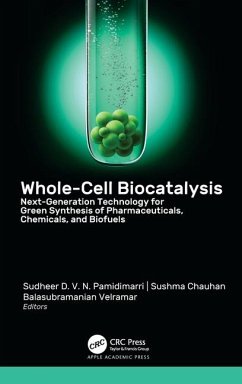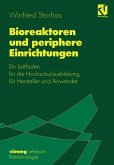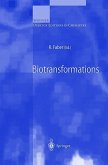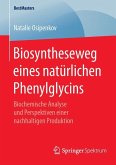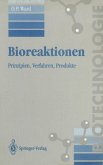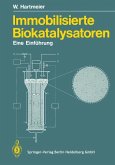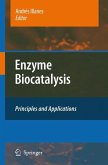Whole-Cell Biocatalysis
Next-Generation Technology for Green Synthesis of Pharmaceutical, Chemicals, and Biofuels
Herausgeber: Velramar, Balasubramanian; Chauhan, Sushma; D. V. N. Pamidimarri, Sudheer
Whole-Cell Biocatalysis
Next-Generation Technology for Green Synthesis of Pharmaceutical, Chemicals, and Biofuels
Herausgeber: Velramar, Balasubramanian; Chauhan, Sushma; D. V. N. Pamidimarri, Sudheer
- Gebundenes Buch
- Merkliste
- Auf die Merkliste
- Bewerten Bewerten
- Teilen
- Produkt teilen
- Produkterinnerung
- Produkterinnerung
A comprehensive book on whole-cell biocatalysis covering basic as well as advanced concepts. Latest developments including computational tools, use of metabolic flux systems, and the role of metabolic networks for the cell system development are discussed using case studies to demonstrate practical uses of whole-cell biocatalysis.
Andere Kunden interessierten sich auch für
![Bioreaktoren und periphere Einrichtungen Bioreaktoren und periphere Einrichtungen]() Winfried StorhasBioreaktoren und periphere Einrichtungen84,99 €
Winfried StorhasBioreaktoren und periphere Einrichtungen84,99 €![Fit in Biochemie Fit in Biochemie]() Rudi HuttererFit in Biochemie54,99 €
Rudi HuttererFit in Biochemie54,99 €![Biotransformations Biotransformations]() Kurt Faber (ed.)Biotransformations39,99 €
Kurt Faber (ed.)Biotransformations39,99 €![Biosyntheseweg eines natürlichen Phenylglycins Biosyntheseweg eines natürlichen Phenylglycins]() Natalie OsipenkovBiosyntheseweg eines natürlichen Phenylglycins79,99 €
Natalie OsipenkovBiosyntheseweg eines natürlichen Phenylglycins79,99 €![Bioreaktionen Bioreaktionen]() Owen P. WardBioreaktionen54,99 €
Owen P. WardBioreaktionen54,99 €![Immobilisierte Biokatalysatoren Immobilisierte Biokatalysatoren]() Winfried HartmeierImmobilisierte Biokatalysatoren79,99 €
Winfried HartmeierImmobilisierte Biokatalysatoren79,99 €![Enzyme Biocatalysis Enzyme Biocatalysis]() Enzyme Biocatalysis183,99 €
Enzyme Biocatalysis183,99 €-
-
-
A comprehensive book on whole-cell biocatalysis covering basic as well as advanced concepts. Latest developments including computational tools, use of metabolic flux systems, and the role of metabolic networks for the cell system development are discussed using case studies to demonstrate practical uses of whole-cell biocatalysis.
Produktdetails
- Produktdetails
- Verlag: Apple Academic Press Inc.
- Seitenzahl: 640
- Erscheinungstermin: 28. Juni 2024
- Englisch
- Abmessung: 234mm x 156mm
- ISBN-13: 9781774914427
- ISBN-10: 1774914425
- Artikelnr.: 70163780
- Verlag: Apple Academic Press Inc.
- Seitenzahl: 640
- Erscheinungstermin: 28. Juni 2024
- Englisch
- Abmessung: 234mm x 156mm
- ISBN-13: 9781774914427
- ISBN-10: 1774914425
- Artikelnr.: 70163780
Sudheer D. V. N. Pamidimarri, PhD, obtained his PhD from the Central Salt and Marine Chemical Research Institute-CSIR, India, in Biological Sciences. After obtaining his degree, he joined Prof. Taek Jin Kang and worked on the aspects of protein backbone cyclization and development of novel protocols for the selective purification of cyclic proteins using engineered eMyc-tag. Later, he worked at various institutions such as the Korean Institute of Energy Research, Daejeon, South Korea; Ajou University, Suwon, South Korea; Kyung Hee University, Suwon, South Korea; etc., in various positions. He started his regular faculty position in India focusing on developing novel routes of producing industrially important chemicals and biofuels utilizing waste biomass. He is presently working as an Associate Professor and Ramalingaswami Fellow at Gujarat Biotechnology University, India. His major research interests are studying and establishing novel whole-cell biocatalysis systems for biofuel and biochemical synthesis. He is a recipient of various awards and scholarships from the Indian government, such as CSIR-JRF, SRF, RA, and the prestigious Ramalingaswami re-entry fellowship, DBT-India. He is also a recipient of various research grants from governmental bodies and industries. His research focuses on metabolic flux engineering, green synthesis of fuels, and bacterial hydrogen production from various waste biomasses. Sushma Chauhan, PhD, obtained her PhD from the Department of Chemical and Biochemical Engineering, Dongguk University Republic of Korea. Currently, she is working as Assistant Professor and Research Coordinator at Amity University Chhattisgarh, Raipur, India, and her research work currently focuses on antimicrobial peptide sequence identification from various medicinal plants and in-vivo synthesis and application as a next-generation peptide-based drugs. Previously, she has worked as Assistant Professor in the Department of Biotechnology, School of Life Science, Guru Ghasidas Central University, Bilaspur, Chhattisgarh, India. She is the proud recipient of the SRD (Study and Research Scholarship) at Dongguk, an international fellowship for perusing her doctoral studies in the Republic of Korea. She worked on protein and enzyme stabilization for next-generation advance application in drug designing and industrial applications. She developed an in-vivo technique for the backbone cyclization of protein and to make the protein thermodynamically stable. In continuation of the same work, she has work on antibody engineering of eMyc-antibody (9E10) for the selective immune-purification of the Myc-tagged cyclic proteins and detection via western blotting. Also, she has worked on cyclic peptide synthesis as a promising inhibitor to block the matrix-metallo-proteases enzyme. She has knowledge of recombinant DNA technology, molecular biology, molecular cloning, enzymology, and in protein engineering techniques. V. Balasubramanian, PhD, is currently working as an Assistant Professor at the Amity Institute of Biotechnology, Amity University Chhattisgarh, Raipur, India. He is well recognized internationally in the field of biodegradation of plastic wastes, especially in finding genes and enzymes involved in the process of plastic biodegradation. He is also working on the developing Band-Aid or dressing material that is coated with the antimicrobial compound in association with nanoparticles that have the potential activities on incurable wounds such as diabetic and leprosy wounds. He is a recipient of awards, honors, and fellowships such as DST-SERB Young Scientist Award, the UGC-Dr. D.S. Kothari Post-Doctoral Fellowship, Best Young Researcher from GRABS Educational Charitable Trust, and CSIR-Senior Research Fellowship. He has written and cowritten more than 40 publications, which include research articles (30 peer-reviewed) and book chapters (13). He has completed one research project from the DST-SERB, Govt. of India, and currently, he has two ongoing projects from state and central governments funding agencies.
PART I: INTRODUCTION TO WHOLE-CELL CATALYSIS 1. Whole-Cell Biocatalysts:
Introduction, Origin, and Concept 2. Tools and Techniques for the
Development of Whole-Cell Biocatalysis PART II: WCB FOR CHEMICALS 3.
Whole-Cell Catalysts: Sustainable Green-Chemical Producing Entities 4.
Microbial Whole-Cell Platforms for the Synthesis of Tricarboxylic Acid
Cycle-Based Platform Chemicals 5. System-Enabled Microbial Cell Factories
for the Production of Biomolecules 6. Biotherapeutic Potential and
Properties of Seaweeds 7. Synthesis and Applications of Biopharmaceuticals
from Whole-Cell Actinobacterial Isolates PART III: WCB FOR FUELS 8.
Microbial Consortia: A Mixed Cell Catalyst for Biotransformation of Biomass
into Biofuels and Chemicals 9. Biofuels: Fueling the Future with
Whole-Cell-Derived Fuels 10. Bioelectrochemical Systems for the Conversion
of CO2 into Sustainable Production of Fuels 11. State-of-the-Art of
Microbial Whole-Cell Catalysts for Biofuel Production 12. Microbial Fuel
Cells: Whole-Cell System for MFC, Current Trends, and Future Prospects for
Green Energy 13. Microalgal Cell: A Machinery for Biofuels Production 14.
Microalgal Cell System for Biofuel Production: Present Leads and Future
Prospects 15. Recent Advances in Algal Bio-Cathode-Powered Microbial Fuel
Cells PART IV: WCB FOR ENVIRONMENT RESTORATION 16. Production of
Biosurfactant by Microbes and Its Application in Biodegradation of
Pollutants 17. Biodegradation of Plastic Wastes by Microbial Cells 18.
Phototrophic Carbon Capture Using Natural Microalgal Whole-Cell Support: An
Eco-Technological Approach 19. Role of Downstream Processing for Production
and Purification of Fermentation-Based Products Produced via Whole-Cell
Biotransformation 20. Microbial Cell Systems for the Bioplastic Production
and Their Applications
Introduction, Origin, and Concept 2. Tools and Techniques for the
Development of Whole-Cell Biocatalysis PART II: WCB FOR CHEMICALS 3.
Whole-Cell Catalysts: Sustainable Green-Chemical Producing Entities 4.
Microbial Whole-Cell Platforms for the Synthesis of Tricarboxylic Acid
Cycle-Based Platform Chemicals 5. System-Enabled Microbial Cell Factories
for the Production of Biomolecules 6. Biotherapeutic Potential and
Properties of Seaweeds 7. Synthesis and Applications of Biopharmaceuticals
from Whole-Cell Actinobacterial Isolates PART III: WCB FOR FUELS 8.
Microbial Consortia: A Mixed Cell Catalyst for Biotransformation of Biomass
into Biofuels and Chemicals 9. Biofuels: Fueling the Future with
Whole-Cell-Derived Fuels 10. Bioelectrochemical Systems for the Conversion
of CO2 into Sustainable Production of Fuels 11. State-of-the-Art of
Microbial Whole-Cell Catalysts for Biofuel Production 12. Microbial Fuel
Cells: Whole-Cell System for MFC, Current Trends, and Future Prospects for
Green Energy 13. Microalgal Cell: A Machinery for Biofuels Production 14.
Microalgal Cell System for Biofuel Production: Present Leads and Future
Prospects 15. Recent Advances in Algal Bio-Cathode-Powered Microbial Fuel
Cells PART IV: WCB FOR ENVIRONMENT RESTORATION 16. Production of
Biosurfactant by Microbes and Its Application in Biodegradation of
Pollutants 17. Biodegradation of Plastic Wastes by Microbial Cells 18.
Phototrophic Carbon Capture Using Natural Microalgal Whole-Cell Support: An
Eco-Technological Approach 19. Role of Downstream Processing for Production
and Purification of Fermentation-Based Products Produced via Whole-Cell
Biotransformation 20. Microbial Cell Systems for the Bioplastic Production
and Their Applications
PART I: INTRODUCTION TO WHOLE-CELL CATALYSIS 1. Whole-Cell Biocatalysts:
Introduction, Origin, and Concept 2. Tools and Techniques for the
Development of Whole-Cell Biocatalysis PART II: WCB FOR CHEMICALS 3.
Whole-Cell Catalysts: Sustainable Green-Chemical Producing Entities 4.
Microbial Whole-Cell Platforms for the Synthesis of Tricarboxylic Acid
Cycle-Based Platform Chemicals 5. System-Enabled Microbial Cell Factories
for the Production of Biomolecules 6. Biotherapeutic Potential and
Properties of Seaweeds 7. Synthesis and Applications of Biopharmaceuticals
from Whole-Cell Actinobacterial Isolates PART III: WCB FOR FUELS 8.
Microbial Consortia: A Mixed Cell Catalyst for Biotransformation of Biomass
into Biofuels and Chemicals 9. Biofuels: Fueling the Future with
Whole-Cell-Derived Fuels 10. Bioelectrochemical Systems for the Conversion
of CO2 into Sustainable Production of Fuels 11. State-of-the-Art of
Microbial Whole-Cell Catalysts for Biofuel Production 12. Microbial Fuel
Cells: Whole-Cell System for MFC, Current Trends, and Future Prospects for
Green Energy 13. Microalgal Cell: A Machinery for Biofuels Production 14.
Microalgal Cell System for Biofuel Production: Present Leads and Future
Prospects 15. Recent Advances in Algal Bio-Cathode-Powered Microbial Fuel
Cells PART IV: WCB FOR ENVIRONMENT RESTORATION 16. Production of
Biosurfactant by Microbes and Its Application in Biodegradation of
Pollutants 17. Biodegradation of Plastic Wastes by Microbial Cells 18.
Phototrophic Carbon Capture Using Natural Microalgal Whole-Cell Support: An
Eco-Technological Approach 19. Role of Downstream Processing for Production
and Purification of Fermentation-Based Products Produced via Whole-Cell
Biotransformation 20. Microbial Cell Systems for the Bioplastic Production
and Their Applications
Introduction, Origin, and Concept 2. Tools and Techniques for the
Development of Whole-Cell Biocatalysis PART II: WCB FOR CHEMICALS 3.
Whole-Cell Catalysts: Sustainable Green-Chemical Producing Entities 4.
Microbial Whole-Cell Platforms for the Synthesis of Tricarboxylic Acid
Cycle-Based Platform Chemicals 5. System-Enabled Microbial Cell Factories
for the Production of Biomolecules 6. Biotherapeutic Potential and
Properties of Seaweeds 7. Synthesis and Applications of Biopharmaceuticals
from Whole-Cell Actinobacterial Isolates PART III: WCB FOR FUELS 8.
Microbial Consortia: A Mixed Cell Catalyst for Biotransformation of Biomass
into Biofuels and Chemicals 9. Biofuels: Fueling the Future with
Whole-Cell-Derived Fuels 10. Bioelectrochemical Systems for the Conversion
of CO2 into Sustainable Production of Fuels 11. State-of-the-Art of
Microbial Whole-Cell Catalysts for Biofuel Production 12. Microbial Fuel
Cells: Whole-Cell System for MFC, Current Trends, and Future Prospects for
Green Energy 13. Microalgal Cell: A Machinery for Biofuels Production 14.
Microalgal Cell System for Biofuel Production: Present Leads and Future
Prospects 15. Recent Advances in Algal Bio-Cathode-Powered Microbial Fuel
Cells PART IV: WCB FOR ENVIRONMENT RESTORATION 16. Production of
Biosurfactant by Microbes and Its Application in Biodegradation of
Pollutants 17. Biodegradation of Plastic Wastes by Microbial Cells 18.
Phototrophic Carbon Capture Using Natural Microalgal Whole-Cell Support: An
Eco-Technological Approach 19. Role of Downstream Processing for Production
and Purification of Fermentation-Based Products Produced via Whole-Cell
Biotransformation 20. Microbial Cell Systems for the Bioplastic Production
and Their Applications

